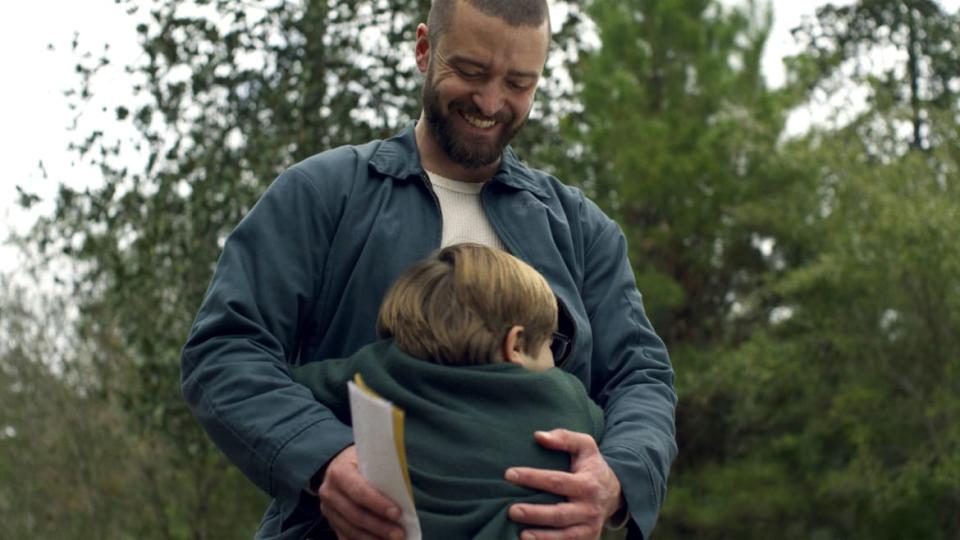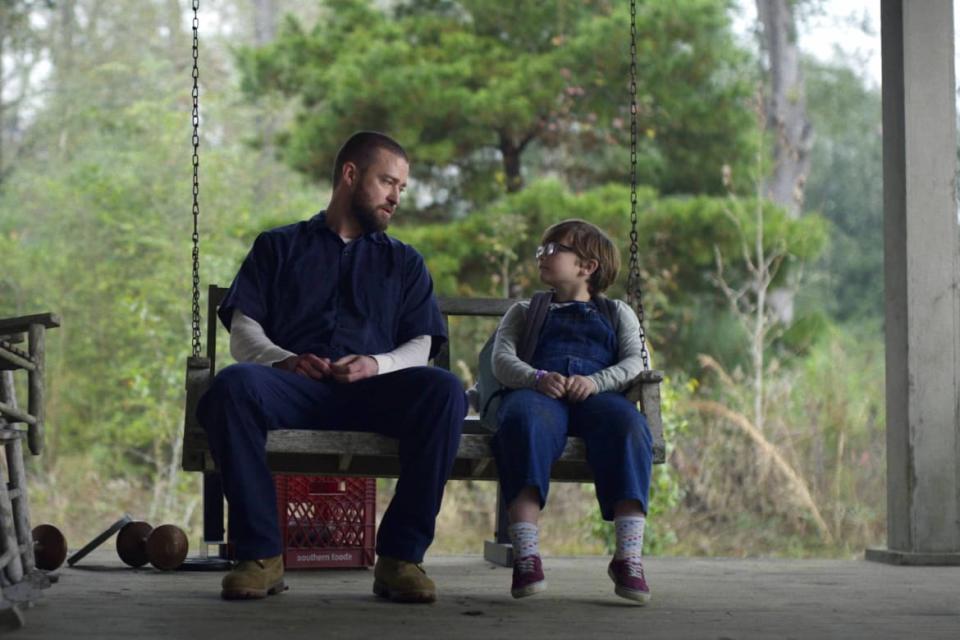Justin Timberlake Is Hollywood’s Latest Savior of Gays

It may be the case that many of us are still floating around in our feel-good stupor, eager to feed the high as long as possible after a four-year plummet down a bottomless emotional and psychological well. It’s not even positivity or hope that we’re hanging on to, but the ability to feel anything in normal ways again—to grieve, to mourn, to feel everything from anger to relief and, yes, even joy.
Maybe we didn’t even realize that, for four years, we’ve been holding our breath. It’s not until we exhaled that we realized that all these feelings were ready to pour out, the good ones, bad ones, and all the ones in between. It’s a lot of feeling to do! It’s exhausting, but also intoxicating.
And riding in on that buzz is the new Justin Timberlake-starring drama Palmer, and its themes of tolerance, redemption, empathy, and the celebration of otherness.
It is cinematic comfort food at a rare and overdue banquet time for earnestness, goodness, and reminders that little sparks of humanity still exist. Palmer is, as far as these things go in the world of art and cinema, genetically engineered to force you to—er, I mean let you—feel things.
In the film, out Friday on Apple TV+, Timberlake plays an ex-con named Eddie Palmer, who after serving 12 years for a felony, returns to his hometown in the rural South to live with his grandmother, Vivian (June Squibb, iconic as always), who raised him. Living in a trailer next door is a nothing-but-trouble single mom (Juno Temple) and her 7-year-old son, Sam (newcomer Ryder Allen). Palmer gazes out the window at them, watching the mother and son play with dolls together, and raises an eyebrow.
Inside Jennifer Lopez’s Chaotic Inauguration Week, From Sex Cannibals and Botox to Biden
Palmer is surprised one morning to find Sam in the house. His mother took off—not for the first time—and, as she’s done before, Vivian takes him in. They eat meals together, and go to church together. Vivian lets Sam do her hair and play with her makeup. Sam is remarkably unself-conscious about his behavior, even around Palmer. “You know you’re a boy, right? Boys don’t play with dolls,” Palmer says. “Well I’m a boy, and I do,” Sam shrugs in reply.
When Vivian tragically dies in her sleep one night, it’s left to Palmer to care for Sam. You would think the two would immediately clash. But Palmer sees the ways in which the community, both kids and adults, bully Sam over his unflappable confidence in himself to proudly want to dress like a princess and have tea parties with the girls at school. Palmer becomes an unflinching supporter and defender of Sam, and the kind of father figure that a boy like that desperately needs.
Folks, you’ll never believe this: They save each other.
The best thing about Palmer is that you’ve seen it before. It’s Big Daddy, but serious. It’s About a Boy, but the boy is gay. I can’t speak to how cognizant the filmmakers, including director Fisher Stevens and screenwriter Cheryl Guerriero, were of this formula, but the film is all the better for not straying from it, hitting every familiar beat with the precision of the strings plucked in the acoustic-guitar score that you can already hear just by my describing this movie.
It loosens the tap on all those aforementioned, bottled-up emotions and lets them spray out with all the force of a firehouse: a deluge of cathartic appreciation for Sam’s struggle, Palmer’s selflessness, and their fortitude in facing the bumpy road ahead in a cruel society.
You will cry, and you will feel good about that. You will be proud of your empathy, and of your wokeness. That little boy Sam doesn’t deserve a hard life just because he likes girly things and lives in a town full of homophobes! It’s a movie that doubles as a pat on the back for its target audience, and therein lies the slight problem.
The messaging is irrefutable. Timberlake, to his credit, is excellent, a triumphant return to a promising acting career that had at one point appeared wobbly. Allen as Sam is a revelation. Palmer is so watchable you almost don’t need to fully pay attention and yet you’d still reap all the emotional benefits. But it’s this thing where I legitimately loved a movie that I’m not sure I’m glad exists.
In addition to the “unlikely parental figure to a lost child” oeuvre, there’s another, increasingly familiar genre that Palmer belongs to: the emotionally manipulative Oscar-bait in which a reformed homophobe transforms into a gay savior. In other words, well-meaning films that don’t so much tread, but abuse, the fine line between human insight and exploiting queer pain.
It’s a complicated tension to discuss, and there are no easy answers about how to tell these stories, or even if they are stories that should be told.
While a far superior film, there are notes of Palmer that are reminiscent of Joe Bell, the Mark Wahlberg drama that premiered at the Toronto International Film Festival this fall, but was just recently moved off the release calendar to a TBD date later this year. There are echoes, too, of Falling, the upcoming film written, directed by and starring Viggo Mortensen about a gay son reckoning with his father’s abusive homophobia as his old age begins to close the window of opportunity for closure.
The two films are emotionally grueling stories about tortured but evolving relationships between unaccepting fathers and their gay sons, and the scars that linger from such a fraught bond. They both have the potential to be eye-opening entrées into complicated conversations about sexuality and masculinity that could do great good for audiences.
But both films also enter the conversation of who should be telling the stories of those who are marginalized and underrepresented. Neither satisfy those tired of watching the struggle for queer acceptance filtered through straight characters’ journeys and crafted by straight creative teams. That shouldn’t wholly discount any of their creative achievements, but it’s a worthy consideration.
How does Palmer enter the picture?
Sam is 7 years old. His sexuality is not discussed, obviously—again, he is 7. But gender identity and expression are at the root of his relations with every character in the film, and especially with Palmer. Those who attack him are portrayed as bigots. But Sam’s journey, while the catalyst for Palmer’s own, is secondary to it. It is once again a film that is centered on the straight, cis character’s redemption.
That itself is becoming somewhat of a trope.
Where once the juicy role for a straight actor was playing the persecuted queer person, now it’s the character who has a crisis of conscience about their role in the persecuting that is appealing. It’s an evolution in the identity politics of casting queer roles, but still begs the question of the value of this kind of storytelling.

There is the presumption that this is something feel-good when it is actually, at least in some respects, doing harm. I can’t tell you how inspiring it is to see Justin Timberlake play a tough guy who becomes completely enamored by and accepting of a gender-non-conforming young boy. It means something—a whole lot, actually—to have on film a father figure wholeheartedly supporting a child in this way. But the abuse that Palmer witnesses, and the audience witnesses, is triggering, in no small way perpetuating and normalizing those things.
It can’t be reiterated enough how complicated all this is. Sam is a heroic character, and it’s so refreshing to watch him present with unbridled confidence, regardless of gender norms. But he’s also infallible. He’s impossible not to adore, precocious and kind-hearted. He has to be in order for a story like this to work. Perfection is still required to balance otherness if audiences are going to get on board.
It’s beautiful to see the ways in which Palmer and different people in the community support and foster Sam’s interest and identity. He’s having a healthier upbringing than most, who are constantly silenced or corrected or abused. When you’re older, out, and proud with a support system, you’re celebrated for your fascination with divas and princesses and pretty things. But what if we gave children, little boys, that same permission? What if playing with Barbies wasn’t illicit, a reason for shame?
Those questions are allowed to be raised in this movie, but only because of Palmer’s own heroic compassion.
The idea of a savior requires someone who needs saving. That lack of agency, even in a story as feel-good as this, is a continuation of the decades of harmful Hollywood tropes in which queerness and gender identity are used as props.
I have no doubt that if you made it this far into this review, you are a person who will be moved by this film. And I’m glad. It felt nice to watch this movie and feel warm inside, to feel good about a better future full of Palmers and Sams.
The fact that the movie is so easy to like and be emotionally affected by is why it also merits such scrutiny. And the most valuable thing it can do is invite the conversation I hope it sparks.
Get our top stories in your inbox every day. Sign up now!
Daily Beast Membership: Beast Inside goes deeper on the stories that matter to you. Learn more.

 Yahoo Finance
Yahoo Finance 